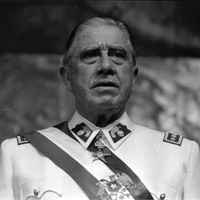Valparaíso, 1915 – Santiago (Chile), 2006
By Rodrigo Nobile
At the age of 17, the future dictator of Chile, Augusto José Ramón Pinochet Ugarte, entered a military career. His first direct participation in politics occurred during the government of the Unidad Popular when he joined the civic-military cabinet instituted by Salvador Allende as a way to alleviate the crisis, which, in fact, served to worsen it.
Using his privileged position, Pinochet learned of the convocation of a plebiscite that would guarantee an institutional transition on September 11, 1973, and brought forward the coup d’état to the same date. To achieve this, he relied on strategic support from the CIA and military backing from the United States Navy, which was stationed off the Chilean coast. He assumed the position of dictator, leading a Military Junta composed of commanders-in-chief from other sectors of the Chilean Armed Forces, establishing a regime of terror that would last seventeen years.
Pinochet’s government can be divided into two phases. The first, which lasted until 1983, after an initial economic crisis, enjoyed a favorable environment, supported by strong political repression and the implementation of neoliberal policies. In the second phase, between 1983 and 1989, the government faced an unfavorable economic situation, forcing it to implement countercyclical policies and gradually initiate an institutional transition process, which led to the end of the military regime.
Neoliberal Shock and Political Repression
Pinochet initially governed through a Military Junta, which sought to address two issues. The first, and most immediate, was to impose socioeconomic stability after a period of intense conflict and economic disorganization, largely caused by actions of the right itself. The second was to develop a new orthodox capitalist accumulation process, based on trade liberalization, reversing income distribution policies with rapid and widespread privatizations, partially rolling back the agrarian reform process initiated under Eduardo Frei Montalva’s government and deepened by the Unidad Popular, and establishing the hegemony of financial capital over productive capital. In response to persistent stagnation, in 1975, the government implemented a new shock policy, executed by Milton Friedman’s disciples from the Chicago School of Economics. This ultraliberal policy resulted in export specialization in commodities and the collapse of sectors such as textiles, household appliances, auto parts, and others. The immediate withdrawal from the Andean Pact, shortly after the military coup, supported this economic trend.
To finance the development of primary-export sectors, investments were made through international bank loans, increasing indebtedness. Other negative factors included the privatizations of banks, industrial sectors, and public services such as social security, health, and education, which favored large corporations and capital concentration.
On the labor front, the government repressed wage-earner organizations, suspended collective bargaining, and encouraged the adoption of individual and flexible contracts.
From 1977 onwards, a new growth cycle emerged, based on increased external demand. However, with the economy based on this accumulation model, only the export enclave experienced real benefits. This generated few positive externalities and increased inequality, evidenced by the proliferation of poblaciones.
As a result of international pressure, the Chilean dictatorship held a plebiscite in 1980, under a state of siege, in which a new Constitution was approved. In reality, this Constitution granted greater powers and immunity to the military, consolidated its policies, and set a new mandate for Pinochet for eight years, at the end of which another popular consultation would be held.
During this period, despite intense repression, popular movements and the left gained strength. In 1977, the first mass protests took place, reaching their peak in 1983 with a wave of protests due to the severe economic crisis that began in 1982, resulting in increased unemployment. Due to mounting debt, the government was forced to turn to the IMF, which implied more austerity and unemployment, among other hardships, and consequently increased dissatisfaction.
At the same time, the crisis destroyed the alliance between the middle and financial bourgeoisie, strengthening Christian Democracy at the center and independent right-wing groups. Armed movements, such as the Revolutionary Left Movement (MIR) and the Manuel Rodríguez Patriotic Front, originating from radicalized Communist Party dissidents, intensified their actions. The latter was accused of organizing a failed attempt to assassinate Pinochet in September 1986.
On the international stage, the agenda shifted to prioritize human rights, leading to pressure from international organizations and reduced support from the U.S. government. Additionally, in this context of change, many countries in the Southern Cone, after experiencing dictatorial regimes, underwent democratization processes.



